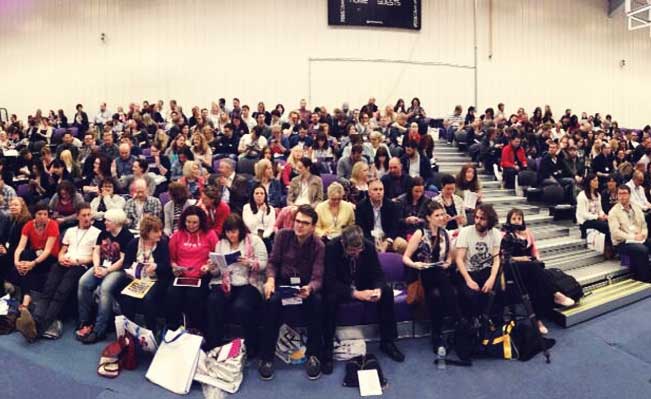 Build it and they will come....#NRocks delegates! Photo credit: @danielbritton
Build it and they will come....#NRocks delegates! Photo credit: @danielbritton
The new education conference ‘Northern Rocks’ proves huge success with over 400 teachers attending. Tony Dowling reports
Would you pay £25 to attend a conference in your own time to discuss your job? Despite working around 60 hours a week according to a DfE survey, hundreds of teachers gathered in Leeds last Saturday for the Northern Rocks Education Conference.
The event was the brainchild of teachers Emma Hardy and Debra Kidd. After attending many education conferences in London they decided it was time for a major teaching and learning event in the North of England – and so ‘Northern Rocks: Reclaiming Pedagogy’ was born. And with over 400 teachers attending it was a resounding success.
As the title implies, the conference set out to challenge the ever-increasing interference of governments in education and to allow teachers to rescue the theory and practice of teaching and learning for the profession. The NUT was one of the 17 education-related sponsors of the event, which began with a panel discussion and Q & A session with: Mick Waters, a professor and former Chief Education Officer; Ian Mearns MP and Labour member of the Education Select Committee; Dominic Cummings, former policy advisor to Michael Gove; Richard Gardner of the Independent; educational journalist Dot Lepkowska, and NUT Deputy General Secretary Kevin Courtney.
The negative impact that PRP (performance related pay) is having on teachers’ motivation and levels of stress was a major point of discussion, as was the less than positive role played by Ofsted – “We need to stop dancing to Ofsteds tune,” said Mick Waters, to unanimous applause.
Dominic Cummings suggested that, “Education is not a priority for any of the three leaders of the main political parties” and that Ofsted and the national curriculum would be ended. As Kevin Courtney pointed out, this was evidence of his desire privatise education – he wants to free up schools for a particular kind of autonomy, specifically market led. Profits end up driving what is happening, instead of organised standards.
Kevin also made the very telling observation that, “hospitals don’t get blamed for poor health outcomes for working class kids, but schools get blamed. We have to stop this!”
One of the most warmly received comments was made by Ian Mearns MP who suggested the starting point for ‘good’ schools and education should be simply, “Happy bairns, learning & achieving” and that teachers “need a metaphoric cuddle.”
Following the panel discussion the rest of the day was made up of four workshop sessions, each with a choice of eight different options, divided into four categories: pedagogy, policy, professional development and reasearch. My personal favourite was Debra Kidd’s ‘Constructing a Curriculum with Conscience’ which demonstrated how pupils can learn to write brilliantly without doing any writing!
The day finished with a humorous look at teaching by Mick Waters and teacher Hywell Roberts which resulted in all those in attendance singing in unison “always look on the bright side of school” followed by a truly surreal but wonderful finale as we were treated to one of those unexpected “you’ll never believe what happened next” moments when Rachel Orr, a primary head teacher from Durham, stepped up and did this.
Northern Rocks was a fantastic antidote to the daily attacks on teachers and education that have become the ‘normal’ discourse in media and political circles.
Despite the negativity around education, a recent survey indicated that 88% trust teachers. And it seems they are right to trust teachers because, as Amy Ladbrook wrote in her blog about the day: “Today showed us what can happen when passionate individuals gather together and focus on what is actually the real business of education, where the focus should really be directed. Imagine what the world of education would be like if all gatherings of teachers had the impact of today? What a world that would be.”
We need more conferences like this to challenge the negative rhetoric of Michael Gove and all those who seek to use education as a political tool instead of utilising the vast pool of talented individuals who make up the teaching profession.

